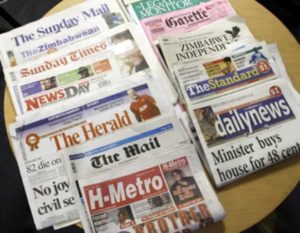Who can forget their role in supporting the repressive Rhodesia regime, in this wanton brutality against the people of this country, whilst labelling liberation fighters as ‘terrorists,’, ‘evil’ ,and ‘barbarians’?
The White Rhodesian system was advanced by the state media as Christians who were on a mission to ‘civilise’ Africans who were several levels below the evolutionary ladder.
Any Africans who dared question, and let alone, resist, this system were described as ‘heathen troublemakers’, who needed to be silenced immediately – this was whilst the majority of the country’s indigenous people wallowed in abject poverty and without much, if any, rights.
Fast forward to independent Zimbabwe, the same state media became the mouthpiece of the ZANU PF mafia that continued the repression of the majority of the people, and – continuing from its Rhodesian days – blindly supported anything the government did, despite the people’s objections.
Similarly, whenever the people resisted, these were regarded as ‘traitors’ and ‘sellouts’, whilst the oppressors were called ‘heroes’ and ‘liberators’.
Even in the midst of a brutal genocide being waged against the innocent and unarmed people of the Mathebeleland, and Midlands regions, the state media – true to nature – stood faithfully by the ruthless regime, as it slaughtered nearly 50,000 people.
This disturbing trend persisted into the 21 century, as the state media callously disregarded the wishes of the people, as it supported a regime that continued to brutalise the population, through blatant physical violence, skewed and anti-people economic policies, flagrant corruption, and other human rights abuses.
Any voices that stood for the people were continually vilified, and opposition organisations were called ‘foreign agents’ who were seeking to return the country to colonial times.
When the private media, civil society, and other groups spoke against rampant corruption within government, the state media denied it.
When the people stood against government antagonistic policies towards the international community as being a major cause of the country’s economic meltdown – the state media accused them of being treasonous – calling Western derogatory names.
When the majority of the suffering people of Zimbabwe resisted the ZANU PF regime’s anti-investment indigenization policies, the state media took them for fools.
When the opposition partied claimed that their supporters were being killed, beaten up, and tortured, and that there was widespread political violence, the state media seldom reported on that.
The then president Robert Gabriel Mugabe and his wife could run this country like their own personal backyard tuck shop, yet the state media never criticised this trend, and never stood by the people whose treasured natural resources were being abused.
In fact, when the military initially announced its intentions to launch its ‘operation restore legacy’, the state media resisted this – being on the side of the Mugabes and the G40 cabal – and had to be ‘convinced’ at the barrel of the gun.
Needless to say, after the military intervention and the taking over of new president Emmerson Dambudzo Mnangagwa, the state media – literally overnight – started supporting what they termed the ‘new dispensation’.
Suddenly, the state media made themselves the chief proponents of a clean government, and – by all standards, seemingly foolishly – accusing the ‘old’ regime of having being corrupt.
The state media waxed all lyrically about fighting government corruption, and suddenly became loud advocates for re-establishing good relations with the West.
The state media started portraying itself as supporters of changes to the country’s indigenous laws.
All issues that the private media, civil society, and the opposition had been advocating over the past decades, yet being called sellouts by this very same state media.
So, can the state media be trusted?
Can it be regarded as reliable, and patriotic?
Who really does the state media represent?
Certainly, its history clearly shows that it does not represent the people of Zimbabwe and their aspirations.
It is merely tool for those in power, and their narrow agenda.
Over the last decades, it is more than clear that only the private media – as far as this industry is concerned – were, and still are, the people only ones truly patriotic ones to be trusted as the voice of the people, without fear or favour.
Tendai Ruben Mbofana is a social justice activist, writer, author, and speaker. He is the Programmes Director of the Zimbabwe Network for Social Justice (ZimJustice). Please call/WhatsApp: +263782283975, or email: a injustices gmail.com. Please also ‘Like’ the ‘ZimJustice’ page on Facebook.
Post published in: Featured 


